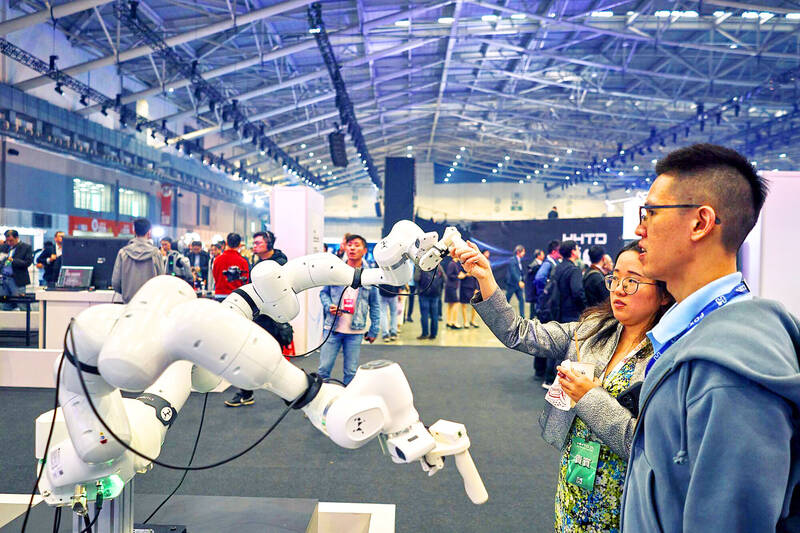The industrial production index rose 14.5 percent year-on-year to 115.11 last month, as strong demand for artificial intelligence (AI) and high-performance computing technology continued to drive production momentum of information and electronic products, the Ministry of Economic Affairs said yesterday.
The manufacturing production index, which comprises 94.63 percent of the industrial production index, increased 15.38 percent to 116.03 last month, recording the 20th consecutive month of annual growth and meeting the ministry’s forecast of 114.22 to 118.22, it said.
In the first 10 months of this year, the industrial and manufacturing production indices rose 16.27 percent and 17.43 percent, respectively, from the same period last year, it said.

Photo: An Rong Xu, Bloomberg
The manufacturing production index this month is expected to rise 10.6 to 14.5 percent year-on-year, supported by robust demand for computers and electronic goods, especially AI servers, Department of Statistics Deputy Director-General Chen Yu-fang (陳玉芳) told a news conference in Taipei.
While geopolitical uncertainties and the US’ “reciprocal tariffs” could make manufacturers cautious about investing, strong demand for computers, electronic goods and optical components is expected to support growth in the final two months of the year, Chen said.
The full-year manufacturing production index could hit a new high and grow by 10 percent this year — surpassing the level of 100 in 2021 — if the index averages 81.6 this month and next month, which is likely, she said.
Last month, production of electronic components rose 21.66 percent, supported by new smartphone launches, while output of semiconductors grew 21.69 percent and that of computers, electronic goods and optical components surged 45.39 percent, driven by AI demand, Chen said.
Production of flat panels and related components rose 10.3 percent to record the second consecutive month of annual growth, driven by output of small panels, Chen said.
Whether this momentum would extend through the end of the year depends on demand from China and holiday sales in the US and European markets, she added.
Traditional industries continued to face pressures of US tariffs and China’s oversupply, with base metal production — primarily steel — falling 2.89 percent, production of chemical materials and fertilizers declining 0.47 percent and vehicle output dropping 4.72 percent from a year earlier, Chen said.
However, machinery equipment production grew 3.44 percent on continued demand for chipmaking equipment, but machine tool makers remained affected by tariffs, she said.

Sweeping policy changes under US Secretary of Health and Human Services Robert F. Kennedy Jr are having a chilling effect on vaccine makers as anti-vaccine rhetoric has turned into concrete changes in inoculation schedules and recommendations, investors and executives said. The administration of US President Donald Trump has in the past year upended vaccine recommendations, with the country last month ending its longstanding guidance that all children receive inoculations against flu, hepatitis A and other diseases. The unprecedented changes have led to diminished vaccine usage, hurt the investment case for some biotechs, and created a drag that would likely dent revenues and

Macronix International Co (旺宏), the world’s biggest NOR flash memory supplier, yesterday said it would spend NT$22 billion (US$699.1 million) on capacity expansion this year to increase its production of mid-to-low-density memory chips as the world’s major memorychip suppliers are phasing out the market. The company said its planned capital expenditures are about 11 times higher than the NT$1.8 billion it spent on new facilities and equipment last year. A majority of this year’s outlay would be allocated to step up capacity of multi-level cell (MLC) NAND flash memory chips, which are used in embedded multimedia cards (eMMC), a managed

CULPRITS: Factors that affected the slip included falling global crude oil prices, wait-and-see consumer attitudes due to US tariffs and a different Lunar New Year holiday schedule Taiwan’s retail sales ended a nine-year growth streak last year, slipping 0.2 percent from a year earlier as uncertainty over US tariff policies affected demand for durable goods, data released on Friday by the Ministry of Economic Affairs showed. Last year’s retail sales totaled NT$4.84 trillion (US$153.27 billion), down about NT$9.5 billion, or 0.2 percent, from 2024. Despite the decline, the figure was still the second-highest annual sales total on record. Ministry statistics department deputy head Chen Yu-fang (陳玉芳) said sales of cars, motorcycles and related products, which accounted for 17.4 percent of total retail rales last year, fell NT$68.1 billion, or

In the wake of strong global demand for AI applications, Taiwan’s export-oriented economy accelerated with the composite index of economic indicators flashing the first “red” light in December for one year, indicating the economy is in booming mode, the National Development Council (NDC) said yesterday. Moreover, the index of leading indicators, which gauges the potential state of the economy over the next six months, also moved higher in December amid growing optimism over the outlook, the NDC said. In December, the index of economic indicators rose one point from a month earlier to 38, at the lower end of the “red” light.